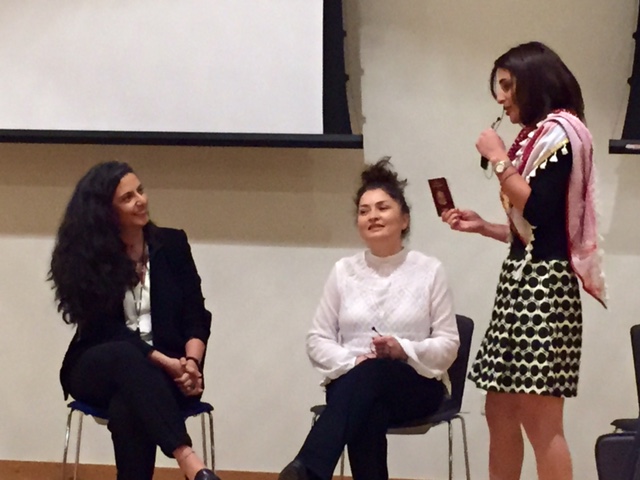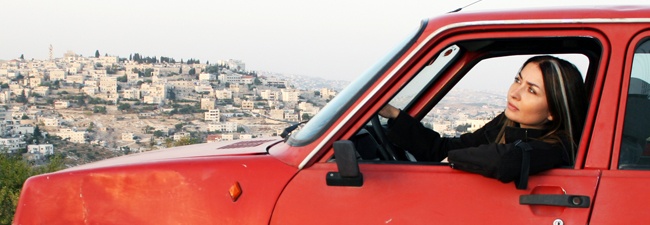|
by Rana Asfour In the Old Testament Bethlehem was the scene of the book of Ruth and the home of David. The tomb of Rachel is nearby. The city is important as the birthplace of Jesus Christ. So, in light of this, the likelihood that filmmaker Leila Sansour would have an epiphany in the heart of Bethlehem of all places should come as no surprise to anyone least of all to herself. The real surprise, for her though, was the subject of her epiphany: To make a ‘big film about a small town’ she couldn’t leave quick enough at 18; Bethlehem: a place she had only planned to be in for a year (after a 20 year absence) filming and documenting the construction of the 8m high wall being built full speed ahead by the Israelis, stifling the members of the oldest Christian community on Earth; The epiphany that would set Sansour on her way to a decade-long journey that she would one day describe as the most life-affirming experience of her entire life despite its many hardships. Last night, seated in a room packed with an audience of over 120 people at the New York University of Abu Dhabi and organised by Red Chair, we witnessed firsthand the outcome of what one person, struck by an epiphany, can achieve once the decision is made to turn dreams into realities. ‘Open Bethlehem’ is an ‘epic film about a legendary town in crisis’ soon to be isolated and cut off from the rest of the world by a wall. The film draws from 700 hours of original footage and some are ‘rare archive material’. The 90-minute film is a tribute to the filmmaker’s late father, a well-known and highly respected member of the community and founder of the Bethlehem University, as well as a record of her personal journey of return. It is also an emotional account of her own experience as her relatives take the painful decision to leave Nazareth as conditions worsen, reflecting a way of life that the Palestinians seem as if incessantly destined to lead. ‘Open Bethlehem’ brings to the forefront the detrimental effects occupation has on the lives and livelihoods of those who are forced to live it and have no alternative but to remain and plough ahead, day after miserable soul-breaking day as they watch the landmarks of their city destroyed, the memories erased, their identity and dignity trampled upon, rendering their futures dismal and bleak. It is a documentation of Israeli injustice that has plagued and continues to plague the lives of millions of Palestinians with no respite or concrete visible solutions in sight, with the rising numbers of settlements, as an army, constantly in advance on newer territory to seize. However, in the face of adversity heroes rise. And there are many in Sansour’s film. From the mayor of Bethlehem, to the shopkeeper who struggles to keep his shop afloat after he finds himself on the wrong side of the completed ‘West Bank Wall’ (that has been deemed illegal by the International Court of Justice) and he soon dies of a broken heart. The young men who face tanks with stones, or peacefully line up from 3am at the gates of the heavily guarded wall to gain access to the other side; the only place where jobs can be had. From the mothers who comfort each other when the Israeli Army reduces houses to rubble and to the children who for a few hours find release in donkey rides, these are the unsung heroes of the Palestinian tragedy.
And then, there is cousin Carol Sansour who convinces Leila not only to stay but to launch the Open Bethlehem Campaign that gives birth to the Bethlehem Passport; a symbolic document issued by the Open Bethlehem campaign in partnership with the Governorate of Bethlehem and a viable solution aimed at alleviating the economic problems of the residents of Bethlehem who rely on a tourism that is staggering under the weight of restrictions imposed by the occupying Israeli forces. The initiative has seen the two cousins travel around the globe seeking recognition for their cause and bringing the story of Bethlehem’s plight to the world. The Open Bethlehem Campaign is first and foremost a tourism initiative intent on opening Bethlehem to all who wish to go there without the need for Israeli permission and clearance, where tourists come to stay as opposed to spending a quick hour photographing Jesus’s birthplace before being loaded back onto Israeli-run mini buses without ever knowing that they ‘had stepped onto Palestinian territory’. The campaign aims ‘to support the distribution of communication tools about Bethlehem to boost international interest and awareness and by promoting visits to Bethlehem through established and specialised tour operators.’ With heroism, comes responsibility and action if change is to be secured. And action is what Leila Sansour is all about as she actively and wholeheartedly pursues a cause she believes in and she does it from Bethlehem; a place that she feels responsible for and from where she plans to launch an online museum of the city to showcase the thousands of items and photographs she has collected in her research over a decade. This is further testament to a woman with endless reserves of energy. ‘In my film I wanted to refuse the branding that comes with being Palestinian,’ she said to the audience last night. ‘That Palestinians are merely victims, problematic and weak. I wanted a new meaning for my identity because I believe identity is imposed on us and ultimately it should be what we as individuals bring to the table. It is about time we created Palestinian identities of our own making. And I choose the active Palestinian because action is a way, I believe, of being Palestinian.’
0 Comments
Your comment will be posted after it is approved.
Leave a Reply. |
Archives
March 2021
|






 RSS Feed
RSS Feed
